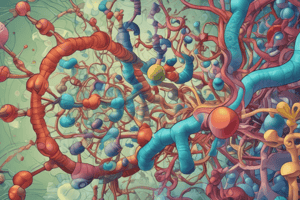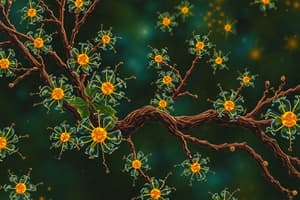Podcast
Questions and Answers
What is the general formula for carbohydrates?
What is the general formula for carbohydrates?
- Cx(H2O)x
- Cx(H2O)y (correct)
- Cx(H2)y
- Cx(HO)y
Which type of carbohydrate is composed of 10 or more monosaccharide units?
Which type of carbohydrate is composed of 10 or more monosaccharide units?
- Disaccharides
- Monosaccharides
- Polysaccharides (correct)
- Oligosaccharides
What is the primary function of carbohydrates in the human body?
What is the primary function of carbohydrates in the human body?
- Regulating cell signaling and recognition
- Providing energy for the brain and nervous system (correct)
- Storing genetic information
- Providing structural support to cells
What is the name of the polysaccharide found in plant cell walls?
What is the name of the polysaccharide found in plant cell walls?
What is an example of a disaccharide?
What is an example of a disaccharide?
What is the role of carbohydrates in DNA and RNA?
What is the role of carbohydrates in DNA and RNA?
Flashcards are hidden until you start studying
Study Notes
Definition and Structure
- A carbohydrate is a biomolecule consisting of carbon, hydrogen, and oxygen atoms, usually in a ratio of 1:2:1
- General formula: Cx(H2O)y, where x and y are whole numbers
- Classified into four main groups: monosaccharides, disaccharides, oligosaccharides, and polysaccharides
Types of Carbohydrates
Monosaccharides
- Simple sugars, cannot be broken down into simpler sugars
- Examples: glucose, fructose, galactose
Disaccharides
- Composed of two monosaccharide units
- Examples: sucrose (glucose + fructose), lactose (glucose + galactose)
Oligosaccharides
- Composed of 3-10 monosaccharide units
- Examples: maltose (glucose + glucose), raffinose (glucose + galactose + fructose)
Polysaccharides
- Composed of 10 or more monosaccharide units
- Examples: starch (plant-based), glycogen (animal-based), cellulose (plant cell walls)
Functions of Carbohydrates
- Primary source of energy for cells
- Structural components of cells (cellulose, chitin)
- Involved in cell signaling and recognition (glycoproteins, glycolipids)
- Storage of energy (glycogen, starch)
Importance of Carbohydrates in the Human Body
- Provide energy for the brain and nervous system
- Fuel for physical activity
- Constituent of DNA and RNA
- Component of glycoproteins and glycolipids in cell membranes
Definition and Structure
- A carbohydrate is a biomolecule composed of carbon, hydrogen, and oxygen atoms, usually in a 1:2:1 ratio
- General formula: Cx(H2O)y, where x and y are whole numbers
Classification
- Carbohydrates are classified into four main groups: monosaccharides, disaccharides, oligosaccharides, and polysaccharides
Monosaccharides
- Simple sugars that cannot be broken down into simpler sugars
- Examples: glucose, fructose, galactose
Disaccharides
- Composed of two monosaccharide units
- Examples: sucrose (glucose + fructose), lactose (glucose + galactose)
Oligosaccharides
- Composed of 3-10 monosaccharide units
- Examples: maltose (glucose + glucose), raffinose (glucose + galactose + fructose)
Polysaccharides
- Composed of 10 or more monosaccharide units
- Examples: starch (plant-based), glycogen (animal-based), cellulose (plant cell walls)
Functions of Carbohydrates
- Primary source of energy for cells
- Structural components of cells (cellulose, chitin)
- Involved in cell signaling and recognition (glycoproteins, glycolipids)
- Storage of energy (glycogen, starch)
Importance of Carbohydrates in the Human Body
- Provide energy for the brain and nervous system
- Fuel for physical activity
- Constituent of DNA and RNA
- Component of glycoproteins and glycolipids in cell membranes
Studying That Suits You
Use AI to generate personalized quizzes and flashcards to suit your learning preferences.




